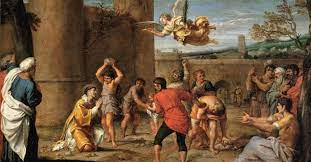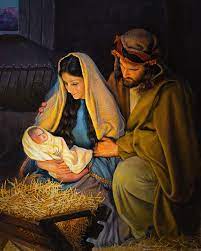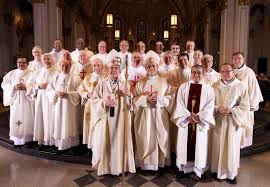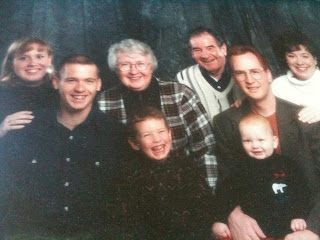_______________________________________________________
Merry Christmas.
I pray you will find time this Christmas season to spend with your family. Our holy families are where many of us find signs of God’s love in our own lives. Even if our family life is complicated.
Christmas
is also a blessed time to celebrate how God’s love broke through our human
existence to shine a light on the outcast, the broken, the rejected, the
oppressed and the marginalized in our world.
Jesus
was born into the world in the humblest of settings: a manger – a feeding
trough for animals. Not a place where many would expect the Son of God to be
born. But it was here he came to us all the same. This is an important point
for us all to ponder.
Today
we commemorate the Holy Family of Jesus, Mary, and Joseph.

As I
reflect on my life, and especially my call to the diaconate, I see how my holy family
helped God to help me to become a deacon. More on that in a moment.
A lot
of people are not familiar with deacons. Deacons have been with the Church
since the dawn of Christianity. Permanent deacons were men and women who served
the Church for the first millennium. But somewhere early in the second millennium
the diaconate became “transitional,” as a year of service before someone was
ordained a priest.
In
1967, Vatican II restored the permanent diaconate to the Church, but not all
Bishops around the world embraced the idea. This is why there are no permanent
deacons in some parts of the world.

He
was one of the first seven deacons called to the Church and was killed after
giving powerful preaching on Jesus to his persecutors who stoned him to death
for blasphemy. He died using similar words to those of Jesus on the cross,
“Lord, do not hold this sin against them.”
The
Catechism teaches what a deacon is in the Catholic Church.
Here’s
what it says,
“Deacons share in Christ’s mission and grace in a special way. The sacrament of Holy Orders marks them with an imprint (a ‘character’) which cannot be removed, and which configures them to Christ, who made himself a ‘deacon’ or servant of all. Among other tasks, it is the task of deacons to assist the bishop and priests in the celebration of the divine mysteries, above all the Eucharist, in distribution of Holy Communion, in assisting at and blessing marriages, in the proclamation of the Gospel and preaching, in presiding over funerals and in dedicating themselves to the various ministries of charity.” (CCC, 1570)
When I was in the final year of my five-year formation, I
was struggling with my call. I was asking God: Is this really what you want for
my life? I would have to give up all my hopes and dreams for retirement. I had
already walked away from my favorite job to have more time for formation and ministry.
I was in a low place, a dark night of the soul.
It
was then I experienced something that helped me to see God’s plan for my life.
In October 2011, my mother-in-law was in the hospital and not doing well. She had buried her 41-year-old daughter, my wife Mary’s baby sister Beth, earlier that year and was still mourning the loss of her spouse eight years earlier.
My
brother-in-law was in Hawaii with friends to celebrate Beth’s life and to spread
some of her ashes at her favorite beach on Maui.
When
Mary’s mom went into the hospital, my wife dashed to her hometown of Spokane to
be with her. But after a week there, work demands forced her to return to the
Puget Sound area.
I
went to be with my mother-in-law until my brother-in-law returned from Hawaii.
I arrived on a Monday night and spent time with her at the hospital. She seemed
fine.
But
the next morning the doctor called at 5 AM to say Marge was going to die that
day. I rushed to the hospital to be by her side, to pray with her the prayers
of the dying, and hold her hand and talk to her in her final hours.
When
she passed, I called my wife immediately and we prayed the prayers for the dead
together.
It
was then I realized what day it was, October 4th, the feast day of
St. Francis of Assisi, perhaps the most famous deacon in the Church.
Then
it hit me like a ton of bricks.
Lord,
you let me witness birth in person for the first time on the Feast of St. Stephen
when our first son was born. And now you let me witness death in person for the
first time on the Feast of St. Francis of Assisi. These are the book ends of
our life: birth and death.
The path to my life was clearly put before me. I was to become a deacon. I no longer had any doubts.
Today’s
feast of the Holy Family of Jesus, Mary and Joseph and today’s Gospel give us
hope. Despite the fact that we might not understand all things, we know that
God has a plan for our lives.
God’s
ways are not always our ways. This is why today’s celebration is called the
Holy Family and not the Perfect Family.
God
creates us uniquely and our differences are what make us holy. We humans live
into God’s plan. Our lives develop in mysterious ways.
Let us journey with Mary and Joseph and Jesus. Let us cast
aside our hopes and our expectations and seek to live God’s will and remain
open to where that journey might take us.
Let us give thanks for our holy families who help us to
see God alive in our lives.






























